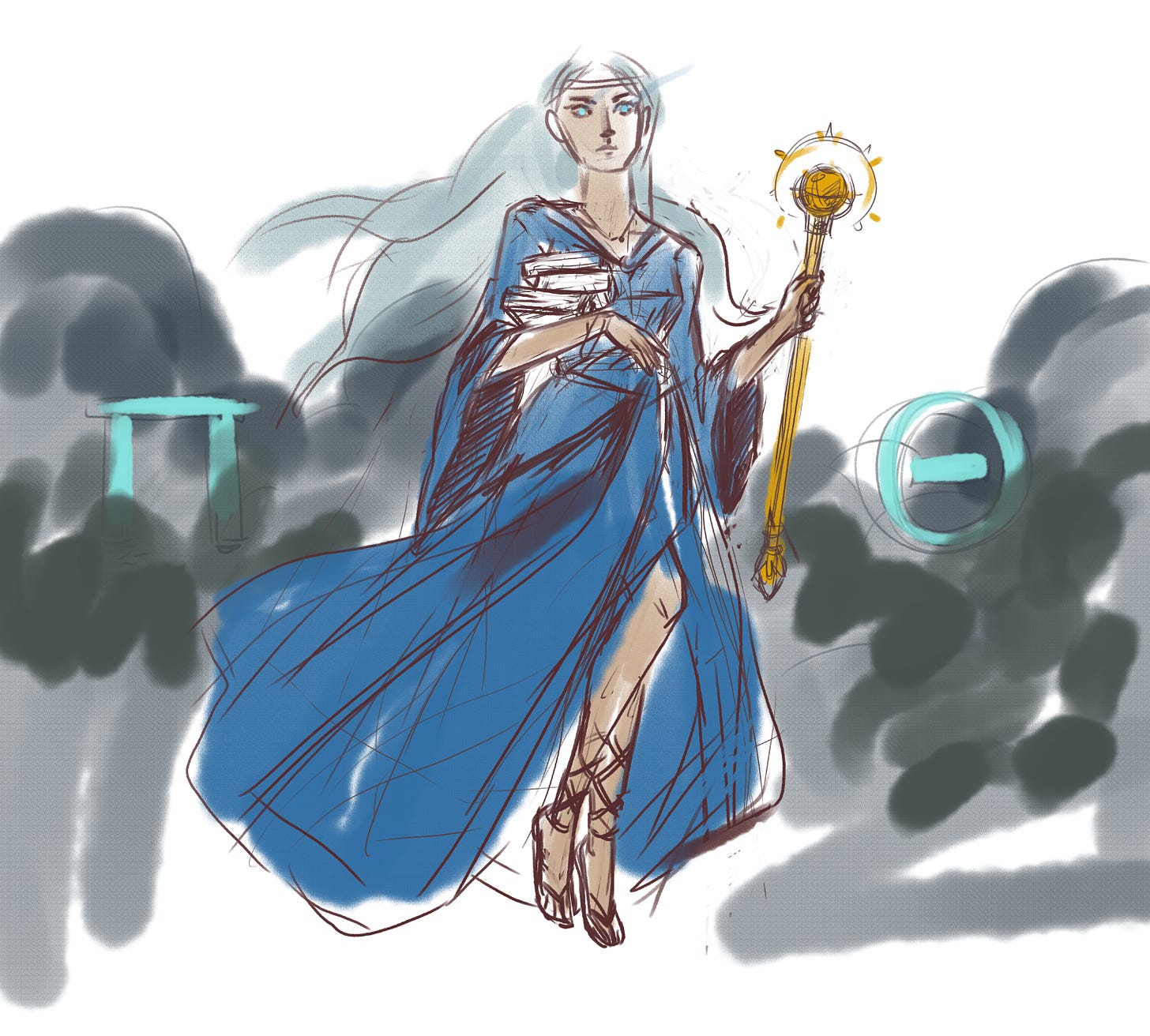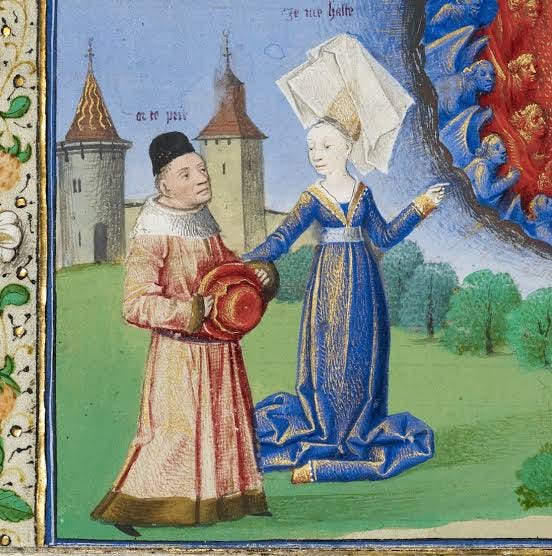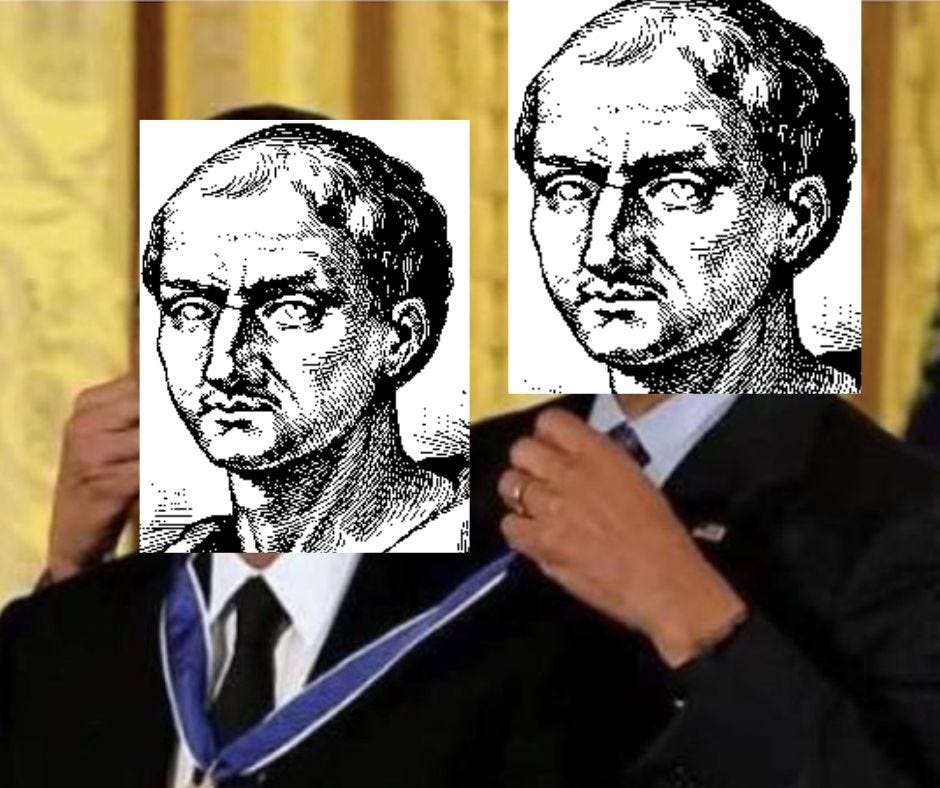True Happiness is Only Found in the Greatest Good | The Consolation of Philosophy Essay 3

Welcome to the Parker’s Ponderings read-along of The Consolation of Philosophy by Anicius Manlius Severinus Boethius.
We’re reading 1 chapter a week for 5 weeks and I’ll share a companion essay each week to help you think about each chapter. If you’re behind, no worries, you can catch up quick. We’re reading the Penguin Classics edition, you can grab that here, but if you have a different edition then use whatever you have. Below is the read-along schedule. I will release the companion essays on the following schedule (I may miss by a day or two here and there). That doesn’t mean you have to have the reading done by that date though.
All the read-along essays are free to read but the two Zoom call Book Club sessions are for paid subscribers, so make sure you upgrade to a paid subscription if you want in on our live discussions or want access to the recordings of those sessions.
Read essay 1 here and read essay 2 here before you read essay 3 below.
Parker's Ponderings is a reader-supported publication. To support my work, consider becoming a paid subscriber, that would be huge!!
Reading/Companion Essay Schedule
July 30th - Essay on Ch. 1
Aug 6th - Essay on Ch. 2
Aug 13th - Essay on Ch. 3
August 16th (Saturday) @ 4pm central time - Book Club Zoom Call 1
Aug 20th - Essay on Ch. 4
Aug 27th - Essay on Ch. 5
August 30th (Saturday) @ 4 pm central time - Book Club Zoom call 2
Reminder: you can support my mission to promote the life of the mind AND you can get tons of members-only content for a few dollars a month. Content like:
full-length notebook philosophy essays/tutorials where I share in-depth instructions on how to use various notebook methods and the philosophers who inspired each method
members-only access to For the Love of Wisdom entries (my digital intro to philosophy text book)
members-only access to Sayings of the Sages, my digital commonplace book of wise sayings I’ve collected over my years of studying philosophy and culture
access to our Zoom Book Club sessions where we discuss the read-along books and my companion essays
the full catalog of members-only essays + lecture videos
access to the members only chat
and lots more!
Additionally, you can now buy me a coffee to show some love too!
Book III
In Book III, Lady Philosophy continues her arguments against false happiness which is built on those goods that aren’t the greatest good. She argues that a desire for the true good—the greatest good, the summom bonum, the fountainhead of all goodness—is implanted in the minds of all human beings and it’s only through error that we turn aside to lesser goods which we think will provide us the happiness which is the rational animal’s true end goal.
She runs arguments similar to those of Book II against the lesser goods of wealth, position, power, fame, and pleasure—acknowledging that these are in fact goods, but not the highest good and thus not sufficient to bring true happiness, for true happiness is only found in the highest good. Wealth doesn’t make you self-sufficient, it makes you depend on others to help you protect your wealth. Public office doesn’t bestow honor or confer virtue, it only brings you under more scrutiny and makes men more despised. Being a king won’t make you happy but invites the anxiety of danger against one’s own person, a sort of Sword of Damocles to hang over you at all times (56). Popularity can’t bring you happiness if the voice of your inner conscience convicts you. And the pursuit of bodily pleasure “is full of anxiety and its fullfilment full of remorse.” (59)
No, in true Platonist fashion, Lady Philosophy argues that these are all shadows of the true good. It’s in chasing the shadows of the Good which is the nature and cause of false happiness.
The Summum Bonum
So what is the true Good, the highest Good—the summum bonum in the Latin—like?
Here Lady Philosophy gives us a master class in perfect being theism. The greatest good would have to be self-sufficient, totally ‘of itself’ (a se) because if it depended on anything else, it wouldn’t be the highest good, that thing it depended on would be—and you can’t have a tie, one has to be thee highest. It would likewise have to be powerful in order to bring about what it needs and wants, again it can’t depend on anything other than itself and it needs to function as the ultimate explanation for all the other goods that have been bought about by it. If it is the highest good, then it is worthy of honor, glory, reverence. And if it is the highest good there possibly could be, then it would also be supremely happy.
But that’s not all. This highest good would have to be unified—more than that, it must be a unity—not consisting of parts for we see that ultimately all these properties are true of the highest good, but the highest good is one substance which is self-sufficient and thus not composed or built up out of other smaller parts. So all these properties differ in name only, they are just different ways of talking about the same thing: the highest good. So since these goods are equally one in the true Good, we ought not pursue them individually—as if we genuinely could. It’s in pursuing them as if they could be separated that we end up settling for false happiness and ultimately misery. (64).
So Lady Philosophy wants to continue probing into the nature of the true Good and seeking to find the source of true happiness, but taking a cue from her servant Plato in his dialogue the Timaeus, she coaxes Boethius into praying to the Father of all things in order to lay a proper foundation (harking back to Proverbs 1:7, the fear of the LORD is the beginning of knowledge.)
In chapters X & XI we see Boethius play the “yes-man” of Plato’s dialogues with profound responses like “that is true”, and “no truer conclusion could be discovered”. I actually love this aspect of the Consolation. It’s not a knock on Boethius that this shallow kind of dialogue shows up, it’s literally an homage to his hero, Plato, who often has Socrates’s interlocutors respond in the very same way. I think it’s just the style of the philosophical dialogue/philosophical soliloquy to have the contrary view holder so utterly illumined by the reasonings that they end up sounding like yes-men. It’s a feature now by the time of Boethius, not a bug.
A Polar Concept Argument for Perfect Happiness
Lady Philosophy goes on to argue that a perfect happiness exists. Why think that? She uses a rare philosophical argument form called a polar concept argument. From the knowledge of a concept we can come to know the polar opposite concept. In his book, Dilemmas, philosopher Gilbert Ryle (grandson of theologian J.C. Ryle) gives the example of a counterfeit coin. From the concept of a counterfeit coin, we immediately know the concept of a true of genuine coin:
A country which had no coinage would offer no scope to counterfeiters. There would be nothing for them to manufacture or pass counterfeits of. They could, if they wished, manufacture and give away decorated discs of brass or lead, which the public might be pleased to get. But these would not be false coins. There can be false coins only where there are coins made of the proper materials by the proper authorities...there must be an answer to the question ‘Counterfeits of what?’ (Gilbert Ryle, Dilemmas (Cambridge: Cambridge University Press, 1954), 80.)
So just as a counterfeit coin entails the concept of a true coin, so too does the concept of imperfection imply the concept of perfection, or so Lady Philosophy argues:
“for everything that is said to be imperfect is held to be so by the absence of perfection. So that if a certain imperfection is visible in any class of things, it follows that there is also a proportion of perfection in it. For if you do away with perfection, it is impossible to imagine how that which is held to be imperfect could exist.” (Consolation, 68).
So then, from the concept of imperfect happiness, we get the concept of perfect happiness. For if there was no concept of perfect happiness, we couldn’t have its polar opposite concept, imperfect happiness. And since “there is a certain imperfect happiness in perishable good… there can be no doubt that a true and perfect happiness exists.” (Consolation, 69).
Perfect Happiness = True Goodness = God?
So now we know there must be a real perfect happiness, but what do we ground it in? Well, Lady Philosophy claims that it’s the universal understanding of the human mind that God is the author of all things and as such he is good (69). And indeed, God is the supreme good, since nothing better than God can be conceived (nam cum nihil deo melius excogitari queat). Now that is actually a massive statement! That’s a statement of St. Anselm’s ontological argument for the existence of God 554 years before he wrote the Proslogion!! The ontological argument is a sort of conceptual argument for the existence of God from the very concept of God: God is that than which nothing greater can be conceived. You can conceive of a perfect being called God but which doesn’t exist? I can conceive of a greater being than that—namely a perfect being called God that DOES exist. Hence, by definition, God exists. Now that’s a rough characterization and it’s gone through many iterations, each more technical and confusing than the last, but it’s really fascinating to find a proto-statement of the ontological argument here in Boethius. It’s like finding Descartes’s cogito ergo sum (I think, therefore I am) in St. Augustine’s City of God: si fallor sum (If I’m in error, I exist 11.26).
So Lady Philosophy goes on to identify, through argument, God with the highest good, perfect goodness for there could be nothing higher than him and to identify God with the true Good stops an unending argument, an infinite regress of explanations. The buck of goodness stops with God—thus we avoid Plato’s Euthyphro dilemma: are things good because God arbitrarily deems them good, or does God consult some higher good above Himself by which He recognizes things as good? Neither. God is the Highest Good Himself—God is the summum bonum—and hence “God and happiness are one and the same thing” since perfect happiness is identified with the greatest good and the greatest good is God. (73)
Boethius affirms something like Plato’s doctrine of recollection, which is the idea that we never actually learn anything new, but that we instead recollect (remember) knowledge that we once had when we preexisted our current earthly existence in the realm of the forms where we had perfect knowledge. He says that he had once recollected these truths but then forgot them due to his distress at being falsely imprisoned. (78)
Lady Philosophy goes on to probe Boethius more in aiding his recollection—to help him remember “the manner in which the world is governed” (78). Boethius breaks out of his “yes, you’re totally correct, perfectly right” responses and gives an argument for God’s existence and providential control of the world from the ancient problem of unity and diversity:
“The world would never have coalesced into one form out of such diverse and antagonistic parts had there not been one who could unify such diversity. Their very diversity in turn would make them break out into dissension and tear apart and destroy the unity of the world unless there were a power capable of holding together what he had once woven.” (79)
The Doctrine of Providence
So the world had to come from somewhere—God is the Author. But God also exercises providence, control over the world. Providence is broken into three parts:
Governance: God controls all things and steers them where He will as a helmsman does with the rudder of his ship (80).
Concurrence: creation is“willingly governed and willingly obey[s] the desires of him who controls them, as things that are in harmony and accord with their helmsman” (80).
Preservation: God also preserves things in existence after He created them, “There is nothing, therefore, which could preserve its own nature as well as go against God.” (80).
So then, “It is the supreme good, then, which mightily and sweetly orders all things.” (80).
But then this implies that God is omnipotent, all-powerful. And Boethius agrees. But then Lady Philosophy asks if God can do evil, since he can do anything since he’s all-powerful. To which Boethius replies “no”. To which Lady Philosophy concludes that “evil is nothing, since that is what [God] cannot do who can do anything” (81). Thus she’s commending the ‘privationist’ view of evil, that is that evil is a privation of the good or goodness, it’s like rust on metal rather than a substance in and of itself, it’s a lack of goodness.
Boethius takes a step back and asks if Lady Philosophy is messing with him, if she’s just reasoning him back into a corner and at the same time he provides a nice précis (summary) of her chain of reasoning in Book III:
“You are playing with me, aren’t you, by weaving a labyrinth of arguments from which I can’t find the way out. At one moment you go in where you’ll come out, and at another you come out where you went in. Or are you creating a wonderful circle of divine simplicity? Just now you began with happiness and said it was the highest good, and you said it was to be found in God. Then you began arguing that God Himself was also the supreme good and perfect happiness and added as a kind of bonus that no one could be happy unless he was also divine. You said that the very form of the good was identical with the substance of God and of happiness. And you taught us that unity itself was the same as the good, because all things had a natural inclination to it. Then you argued that God rules the universe by helm of goodness, that all things obey willingly, and that evil is nothing. All of which you unfolded without the help of any external aid, but with one internal proof grafted upon another so that each drew its credibility from that which preceded.” (82)
That last sentence is a bit of a pat on the back lol—remember both characters are actually Boethius haha it’s a soliloquy!
Lady Philosophy ends by describing the divine substance, aka God, as a se, of itself, and not extended nor composed of parts or anything external to itself. The divine substance “rotates the moving sphere of the universe while remaining itself unmoved.” (82) Thus identifying God the Father, whom Boethius prayed to earier in Book III with the God of the philosophers, namely Aristotle’s conception of God as the unmoved mover who is the telos of all things, which all things move toward but is itself unmoved.
Boethius continues to blend Jerusalem, Athens, and Rome, pulling in Greek mythology like Orpheus and Eurydice in the last poem on pg. 82. It really is amazing all the sources he pulls from and how he anticipates so much of Christian theology like perfect being theism and the tripartite division of providence in governance, concurrence, and preservation as well as seeking to answer the Euthyphro dilemma of Plato and trying to settle the debate over the God of the philosophers and the God of the Bible.
Alright, that does it for Book III.
I’m excited to talk with my paid subscribers this Saturday, August 16th @4pm central. I will drop the Zoom link in the paid subscriber chat later this week. If you want in on those Zoom Call Book Club sessions then upgrade to a paid subscription and come join us. The more the merrier!






After seeing the rough sketch, I am even more stoked about the artwork commission.
Thanks for this Parker! You help lay out the arguments well!!!
Excited to chat and ask more questions!!!